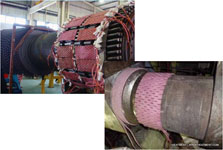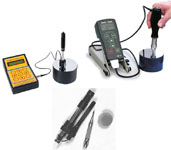HEAT TREATMENT
Pre-Heat Services
Pre-heating is the heat applied to a base material or substrate to reach and maintain a preheating temperature.
Proper preheat and intermediate pass temperatures are important to avoid hydrogen cracking.
Preheating can be done by gas burner, oxygen gas flame, electric blanket, induction heating, or heating in an oven.
Uniform heating of the entire joining area is essential for good results.
If preheating is required, the entire weld joint must be heated uniformly throughout the thickness of the material to the desired minimum temperature.
To achieve a uniform temperature throughout the thickness of the material, it is desirable to place the heating source on one side of the material surface and measure the material temperature on the opposite side.
HEAT TREATMENT (Localized)
Post Weld Heat Treatment (PWHT) is a term that refers to any heat treatment that is applied to a material after welding. The process is often used to improve the properties of the weldment. In most cases, the goal of PWHT is to increase the resistance of the material to brittle fracture by relaxing residual stresses which can occur in weldment due to restraint by the parent metal during weld solidification.
the material to brittle fracture by relaxing residual stresses which can occur in weldment due to restraint by the parent metal during weld solidification.
APPLICATIONS
- Weld inspection – Structural / Piping
- Casting / Forgings / Valves
TRACK RECORDS / SPECIALTIES
- Pre-Heating / Post Weld Heat Treatment/Normalizing
- 250M Length FPSO Stones Turret done in Single Firing
- 50KVA Equipment / 270 KVA Imported Heavy Equipment
- Resistance Method / Induction Method
FURNACE HEAT TREATMENT
We have dismantling type Furnace which is fabricated by many panels of structures, it can be re designed and re-sized.
APPLICATIONS
Heavy Structures such as turret / turret assemblies can be done in single firing
Many Pipe Spools can be done in short time
TRACK RECORDS
- Tullow Ten Sofec Turret
- Scarv Turret
- BP QUAD 204
HARDNESS TESTING
Hardness is a characteristic of a material, not a fundamental physical property. It is defined as the resistance to indentation, and it is determined by measuring the permanent depth of the indentation. More simply put, when using a fixed force (load)* and a given indenter, the smaller the indentation, the harder the material.
given indenter, the smaller the indentation, the harder the material.
APPLICATIONS
- Verification of Hardness after PWHT
- Material Hardness verification after machining
